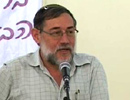- Torah Portion and Tanach
- Vayera
240
The midrash (Midrash Aggada, Vayeira 18) explains the importance of Hashem’s notification to Avraham. It relates to Hashem the following sentiment: "I gave this whole Land to Avraham, and now I want to destroy five of its cities due to their sins. If I do not tell him, he will be able to say that I backed out of My commitment." The midrash does not tell us what lesson we learn from this conversation or what the connection is to the description of Avraham’s educational legacy. We will try to do this through other passages in Chazal.
At the end of Sefer Shmuel, the navi deals with a difficult episode in the life of David. A strong famine was afflicting the Land after the death of Shaul; David became aware that it was due to the mistreatment by King Shaul of the Givonim, who were not part of the Israelite nation. David approached them with an inquiry as to what could be done to appease them so that they would pray for the welfare of society. Their frightening request was to have seven of Shaul’s descendants given to them to be killed and displayed publicly (Shmuel II, 21: 2-6). Only harsh revenge and not some other form of compensation or appeasement sufficed for them. While David was compelled to accept these demands, the episode brought him to a decision that impacted on all generations. The Givonim would not be allowed to marry into general Jewish society, even though they underwent the conversion process (see Shulchan Aruch, Even Haezer 4:2). The gemara (Yevamot 79a) explains David’s rationale, which seems strange considering that Hashem supported their right to make the demand that they did. The Jewish people have three qualities: the people are merciful (rachamanim), bashful, and do acts of kindness (the pasuk brought as evidence is the above pasuk about Avraham). Those who do not share such qualities are not fit to join. Rashi (ad loc.) explains that the Givonim had shown that they were not merciful.
Rashi teaches us that rachamim is not just to feel bad for the weak and oppressed. Rachamim applies to forgiving those who harmed them and deserve punishment yet ask to be given the opportunity to appease their victims and be forgiven. Avraham, on the other hand, was the clear contrast. He tried to save the evil people of S’dom and succeeded in saving Lot, his nephew who had upset him. He internalized the message of forgiveness, whether it be of family members with whom one quarreled or another who harmed him. That is why Hashem’s beloved Avraham was the father of the nation of merciful, bashful doers of kindness.
May this national quality find increasingly active expression in our present-day Israeli society.

May I Keep the Skeletons in the Closet?
What Personal Information Must I Divulge?
Rabbi Yirmiyohu Kaganoff | Adar I 7 5782

Shehecheyanu, Clothes, and Renovations During Sefira
Rabbi Daniel Mann

Tefillin Retzuos, Maintenance, and Purchasing Instructions
Rabbi Yirmiyohu Kaganoff | Elul 1 5779

Zera Yisrael
Rabbi Yossef Carmel | Tevet 12 5777
Daf Yomi Makkot Daf 22
R' Eli Stefansky | 2 Iyar 5785

The Yom HaZIKARON SIREN- EVERY ARROW NEEDS A HEAD!
Rabbi Ari Shvat | Iyar 5785
Daf Yomi Makkot Daf 20
R' Eli Stefansky | 30 Nisan 5785







